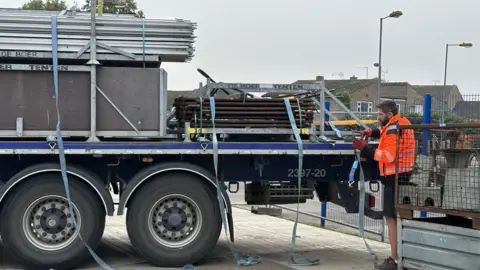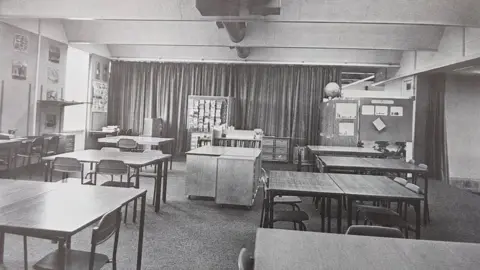Concrete-crisis schools to end online lessons
 Anna Louise Claydon/BBC
Anna Louise Claydon/BBCFive schools in the county worst affected by the unsafe concrete crisis are still teaching some children using remote learning.
The government identified 174 schools and colleges in England fitted with Raac (reinforced autoclaved aerated concrete), of which 62 were in Essex.
Essex County Council said pupils at the five schools would return to "full-time face-to-face" shortly after half-term.
Opposition councillors have criticised "short-sighted" building decisions.
 Gabi Besevic-Simpson
Gabi Besevic-SimpsonThe council's Conservative education cabinet member Tony Ball told a full council meeting on Tuesday: "We will not lose sight of the fact that we have a great deal of pupils in Essex that are accessing part of their education remotely, and working in close partnership, we are continuing to prioritise their return to full time face-to-face education and learning."
Just before the new school year started in September, the government advised schools in England to immediately shut buildings with Raac.
The schools still using some remote learning in Essex were:
- Roding Valley High School
- The Billericay School
- The Bromfords School
- The Honywood Community Science School
- Thurstable School Sports College and Sixth Form Centre
At the meeting, Liberal Democrat opposition leader Mike Mackrory blamed a "short-sighted" building policy used 50 years ago.
BBC research previously revealed the former county architect for Essex Ralph Crowe, who died in 1990, designed a cheaper building system using Raac.
 Essex Record Office C/DA 9/5
Essex Record Office C/DA 9/5 Mr Mackrory said: "I seriously question the judgement of this council which at the time led the way in constructing schools in the 1970s and 1990s with a building material which was known to have a life expectancy of 30 years or 40 at most.
"It was cheap - it was quick."
Mr Ball said it was "distasteful" to "blame people who took decisions for the right reasons at that time".
The Labour group highlighted government cuts to the planned schools maintenance budget a decade ago affecting Essex schools.
The Essex County Council-governed area does not include the unitary authorities of Southend-on-Sea and Thurrock.

Follow East of England news on Facebook, Instagram and X. Got a story? Email [email protected] or WhatsApp 0800 169 1830
